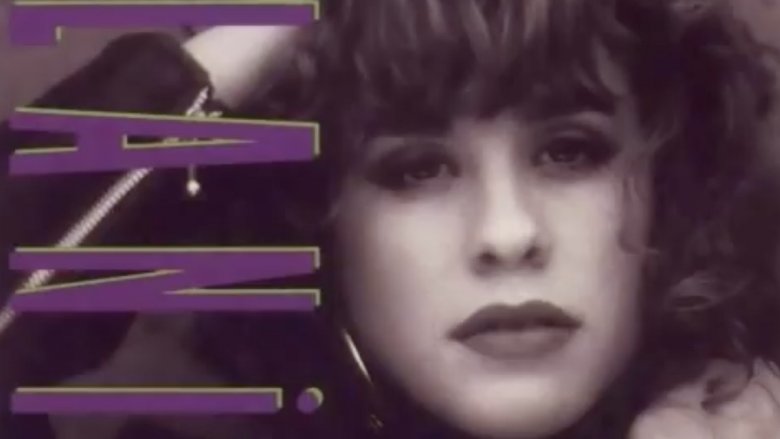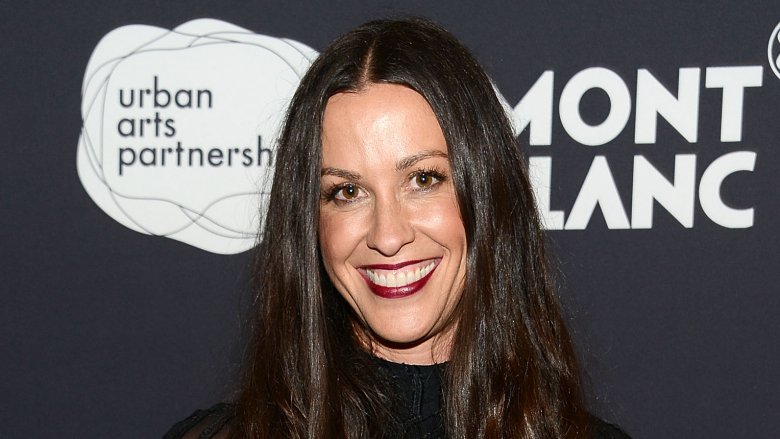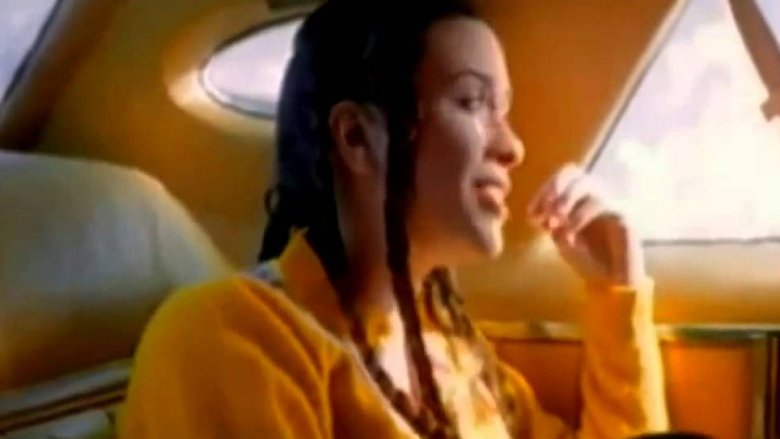The Untold Truth Of Alanis Morissette
Her voice shaking with anger as she tersely uttered the cold open of her 1995 single "You Oughta Know" — "I want you to know" — Alanis Morissette made a bold and auspicious debut. She announced herself as a woman of many thoughts and many feelings, and that song, a top 10 smash that resonated with scorned exes across the land, was just a taste of what followed on Morissette's album Jagged Little Pill. The collection of songs on which Morissette bared her soul on everything from love to irony to wisdom to religion to the pitfalls of ambition rang true with millions, as it went on to sell a stunning 33 million copies worldwide.
Alanis Morissette, just 21 when she won the Grammy for Album of the Year, wasn't an overnight success. She'd already had a career as a singer of throwaway dance pop in Canada but had managed to completely reinvent herself, something she would do on album after album. We're here to remind you that there's a lot going on with Alanis Morissette. Here's a look at what you oughta know about the Canadian rock icon.
Was she really that big in Canada?
In the wake of the success of Jagged Little Pill in 1995 and 1996, Alanis Morissette earned a Grammy nomination for Best New Artist (she lost to Hootie and the Blowfish) and an MTV Video Music Awards win for Best New Artist in a Video (she beat Jewel). But Morissette wasn't exactly a neophyte. The official line was that she'd been a teen-pop star in her native Canada and had evolved to perform gritty, edgy, confessional alt-rock. Clips of a big-haired Morissette performing songs like 'Too Hot" surfaced, earning her comparisons to Tiffany and Debbie Gibson. Conventional wisdom held that Morissette was just as successful (at least in Canada) as those predecessors, but that was an inaccurate assumption. Morissette was never a superstar during her Canadian dance-pop days. She released a total of eight singles in that era, and none made the top 10. Her 1991 debut, Alanis, peaked at a middling #28 on the Canadian album chart and sold 100,000 copies. The follow-up, 1992's Now Is The Time proved it wasn't the time for Morissette, moving only half as many units as Alanis. MCA Records actually dropped her at that point.
Fame was fickle
Alanis Morissette's trajectory to fame in the United States, that obscure media market that sits just south geographically of her native Canada, was hardly straight and upward. While she eventually sold tens of millions of albums to disaffected American youth, that was after a middlingly successful career as the Canadian equivalent of Tiffany, which came after and concurrent to some attempts to make it big in the U.S.A. In 1986 she was a cast member on Nickelodeon's zany, Canadian-produced sketch comedy hit You Can't Do That on Television, and in 1990 she competed on Star Search under the name "Alanis Nadine." She lost.
At the height of early '90s fame for rapper Vanilla Ice, Morissette performed as his opening act on tour — she later told the Guardian that she "was instructed not to look him in the eye" — but enjoyed little to no runoff fame from it. She also appeared (as herself) in the Corey Haim movie Just One of the Girls, which could have garnered her a lot of attention if the movie had been released in 1988 and not 1993, or if it had been released to theaters instead of home video.
Take one, take two, perfect, moving on
In spite of not sounding like anything else going on in mainstream music at the time — or perhaps because of that — Alanis Morissette's Jagged Little Pill became a blockbuster hit and cultural phenomenon in the mid-1990s. In the waning days of grunge, with its fuzzy, down-tuned guitars and mumbly male singers, here came a record full of tracks showcasing a woman with huge vocal and emotional range, and backed up by little more than some light electric guitars, keyboards, and a drum machine. In other words, it sounds like a demo, a simple, if not raw, collection of songs demonstrating proof of concept. Actually, Jagged Little Pill is essentially a demo. Morissette laid down each and every song on the record in one or two takes. Why? It's more honest, according to the musician. Quickly cutting those songs was "the shortest distance from the personal to the universal," she told Billboard in 1996 (via Entertainment Weekly). She didn't spend much time writing songs, either. Co-writer and Jagged Little Pill producer Glen Ballard told the AV Club that Morissette took scarcely an hour to write "Hand in My Pocket," and the same was true for "Perfect."
Who's "You Oughta Know" about? Cut it out!
While the identity of the bad boyfriend who inspired Alanis Morissette's "You Oughta Know" remains a secret, there are some candidates. Dave Coulier — Joey Gladstone on Full House — dated Morissette in the early '90s, and he thought the song was about him because of the lyric "I hate to bug you in the middle of dinner." In 2013, he told HuffPost Live (via Us Weekly) that after they'd broken up, Morissette "called and I said 'Hey, you know, I'm right in the middle of dinner. Can I just call you right back?'" On a 2014 episode of Watch What Happens Live, Coulier's Full House co-star Bob Saget lent some weight to the Coulier theory. "I was at his house and he said, 'Alanis just hung up on me and said sorry for calling you during dinner,'" Saget reported. But later that year, Coulier backtracked, telling BuzzFeed that "it's just funny to be the supposed subject of that song."
According to Snopes, rumors have swirled around some of Morissette's other former flames, including hockey player Mike Peluso and Friends actor Matt LeBlanc, who played the love interest in Morissette's video "Walk Away" years before his hit TV show. The mystery will probably die with Morissette. "There's probably 12 other people who have told the whole world it's about them," she told Access Hollywood (via the Toronto Sun). "I'm not even going to corroborate any of it because they'll never know and I'll never say."
Okay, but is THIS ironic?
Alanis Morissette's "Ironic" stormed the Billboard pop chart in 1996, peaking at #4, a breath of fresh air as it's one of approximately five songs in pop music history that isn't about love or romance or the loss of either. In this darkly comic song, Morrissette offers up "ironic" stories of bad things happening to people, like rain on a wedding day or a 98-year-old man dying the day after he won the lottery. The problem is that very few of the song's examples actually fit a dictionary definition of irony (something unexpected or something different from reality), and that inspired countless smug think pieces and stand-up comedy routines dedicated to pointing this out for everyone.
On her Spotify Landmark installment (via The Outline) discussing Jagged Little Pill, Morissette acknowledged the backlash. "I've had my ass kicked for 20 years about it," she said. "I think people had a lot of issues with perhaps my 'stupidity,' or [co-writer] Glen [Ballard]'s and my lack of caring for being perfect." And frankly, she says, it doesn't much bother her because she was just trying to be funny. "For us it was just making each other laugh that whole song."
She thinks success gave her PTSD
Part of being the "next big thing" in music is being "the huge thing right now." The release of Jagged Little Pill in 1995 and the explosive popularity of hit singles "You Oughta Know," "Hand in My Pocket," "Ironic," and "You Learn" (as well as their memorable videos) meant that for a spell of about two years, nobody was bigger than Alanis Morissette. (Okay, maybe Hootie and the Blowfish.) But with that success came a great deal of scrutiny (like the new national pastime of guessing who "You Oughta Know" was about) and criticism (like how she got faulted for not using "ironic" correctly). Morissette took fame and success for exactly what it was then: a double-edge sword. "I think fame became exciting for me in the late '90s because I could actually use it as a means to an end," she told the Guardian in 2012. "I could actually have it help me service my vocationfulness. I could offer comfort and upliftment." (Okay, with word choices like "vocationfulness" and "upliftment," maybe it isn't surprising she misused "ironic.")
On the other hand, life became a living nightmare during Alanismania. Morissette has said she suffers from "PTSD from the Jagged Little Pill era." And when you hear the sorts of things she was going through, that's maybe not surprising: "It felt like every millisecond I was attempting to set a boundary and say no and people were breaking into my hotel rooms and going through my suitcase and pulling my hair and jumping on my car." You live, you learn?
Leaks of "Uninvited" were, well, uninvited
By early 1998, the nearly 13 million people who'd purchased Jagged Little Pill were antsy for any new material from Alanis Morissette. Her follow-up: a cut on the tie-in soundtrack of the Nicolas Cage supernatural romantic drama City of Angels. That album, including Morissette's epic, string-backed power ballad "Uninvited," was scheduled for release on March 31, 1998, but the song leaked early, according to Newsbytes (via MTV), hitting the radio on March 6.
Radio stations around the world, including major Los Angeles alternative rock broadcaster KROQ, played the bootleg on the air, and a number of listeners recorded it and uploaded it to their personal websites. The Recording Industry Association of America sprung into action, managing to entirely shut down sites that posted the unauthorized track. But even in 1998, once something was on the internet, it was on the internet for good. So rather than let radio stations keep playing a poorly recorded copy of Morissette's song, label Warner Music released the entire soundtrack to radio weeks before it was available in stores.
She's an internet tycoon
Alanis Morissette shot to fame in the mid-1990s, where she made millions on two of the era's biggest scams: artificially expensive compact discs (record labels had to pay out millions following a class-action lawsuit over price gouging), and the early internet bubble. In 1999, Morissette agreed to endorse streaming music pioneer MP3.com, a company that record labels later accused of illegally distributing (and making money on) copyrighted music for which it had not completely secured the rights. As part of her compensation package, the fledgling internet company gave Morissette's management company the chance to buy MP3.com stock at an attractive, bargain-basement rate of just 33 cents per share. So, the singer spent a little over $100,000 to buy nearly 330,000 shares. Just before MP3.com completely fell apart in 2000, Morissette sold off a huge chunk of it for $1.2 million. That means she grew her investment by nearly tenfold, making the "Ironic" singer a full-fledged internet millionaire.
Don't steal from her
Alanis Morissette lost any extra cash she had earned during her quick turn as an MP3.com investor — and then some. In May 2016, Morissette filed suit in Los Angeles County Superior Court against Jonathan Schwartz and GSO Business Management, her one-time business manager and his company. Alleging breach of fiduciary duty, fraud, and negligence, she alleged that Schwartz stole well over $4 million from her. Morissette says Schwartz led her to believe that her finances were in spectacular shape, but that in actuality he and GSO "were draining her assets and leading her on a road that could have led to financial ruin," the legal complaint said.
After Morissette fired Schwartz in March 2016 for being unresponsive to her queries about financial matters, his replacement discovered records of more than 100 cash transfers from Morissette's accounts to Schwartz, which totaled more than $4.7 million. (She didn't authorize them, nor did she know about them.) Schwartz ultimately pleaded guilty to various financial crimes in 2017 and received a six-year prison sentence. He also issued a public apology to Morissette and other clients he wronged (which surely must have made everyone feel better).
A legal circus over Circus
Suing a sticky-fingered financial manager isn't the only time Alanis Morissette put the legal system to work: She also filed suit in 2014 over a dog. Back in May 2011, Morissette and her husband, Mario Treadway, found a seemingly homeless pug/Chihuahua mix roaming the streets. They took the animal to a local shelter, but nobody claimed him so they went ahead and adopted the cute little thing and named him Circus. That dog became part of the family, with house manager Maria Garcia developing a particular fondness because she took care of it when Morissette was off touring and such.
When Morissette and Treadway terminated Garcia in January 2014, Garcia requested custody of Circus as part of her severance package. That might have been a negotiation tactic, except that, as Morissette and Treadway argued in a lawsuit filed in Los Angeles County Superior Court, Garcia had already kidnapped Circus when she asked if she could have him. The suit requested $25,000 and a judge's order to return Circus. About six weeks later, Morissette withdrew the suit after Garcia brought the dog back.
Taylor Swift is a fan, but Taylor Swift's fans are not fans
Alanis Morissette is a true pioneer. While many other female singers before her made honest, emotionally driven music that rocked, she made it palatable to as wide an audience as possible. For example, Jagged Little Pill has now moved than 16 million copies in the U.S. alone, one of the 20 best-selling albums ever in the United States. Other female singer-songwriters that followed Morissette into music, baring their souls along the way, owe a debt to the musician.
Taylor Swift is well aware that her career might not have been so wildly successful had Morissette not carved out her creative niche, and she wanted to acknowledge her appreciation. At an August 2015 concert in Los Angeles, Swift brought out Morissette as a surprise guest. They performed "You Oughta Know" together with Morissette taking lead and Swift doing some backup stuff. According to Jezebel, some fans just lost it for the special duet, but many others, like those who weren't alive when Morissette hit the big time in 1995, took out their phones mid-song to get on Twitter to express their anger and confusion over this 40-something woman interrupting good ol' T-Swift. Some of them also just plain didn't know who Alanis Morissette was. Ouch.











